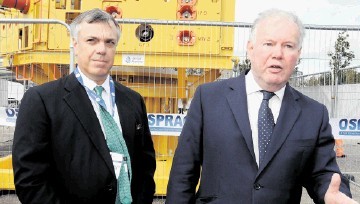
THE date April 20, 2010, will be forever etched on the collective memory of the oil and gas industry. This was the night a massive hydrocarbon release engulfed the Deepwater Horizon while drilling the US Gulf of Mexico Macondo field, claiming the lives of 11 men and unleashing the largest oil spill in the history of the American petroleum industry.
How the upstream oil and gas industry around the world responded to this tragic incident was significant. Alongside the immediate offers of practical support was the recognition of the need for sombre reflection and challenge with regard to industry drilling practices and procedures. Macondo raised important safety questions which no company or national regulator could ignore. There was no room for complacency.
In the UK, the industry reaction was swift. In just a month, the UK Oil Spill Prevention and Response Advisory Group (OSPRAG) had been mobilised to secure an unprecedented level of co-operation and collaboration across the UK offshore oil and gas industry, its regulators and the trade unions.
Their immediate task was to carry out a thorough review of drilling practices on the UK Continental Shelf (UKCS), first to satisfy that it was still safe to continue to operate and then to look to see what enhancements might be possible for the existing prevention and response mechanisms.
OSPRAG has achieved much in 16 short months. Its review of the UK’s oil spill prevention and response practices and procedures, believed to be the largest and most thorough ever conducted by the industry, has given rise to a high degree of confidence in the current regulatory regime and reassurance that it drives the right health, safety and environmental behaviours.
Where OSPRAG identified improvements that would further strengthen the UK’s capability, the industry voluntarily dedicated significant resource, both in personal expertise and financial support, to take forward the group’s recommendations.
As a result, UK operators now have access to the groundbreaking OSPRAG Cap, designed to swiftly seal off an uncontrolled well and to be ready for deployment in the unique met-ocean conditions to be found in the UKCS.
As such it forms a key element in the UK offshore oil and gas industry’s oil spill emergency contingency plans. It was unveiled by energy minister, Charles Hendry, at Offshore Europe last month.
Two new pan-industry forums have been created to provide expertise in the specialist areas of well life cycle practices and oil spill response.
These forums will be important vehicles for ensuring the full implementation of OSPRAG’s recommendations and, as permanent groups under the governance of the UK industry’s trade association Oil & Gas UK, will ensure the industry continues on the path of improvement long after OSPRAG’s disbandment.
The industry’s financial responsibilities in meeting the potential clean-up and compensation costs associated with a major oil spill have also been scrutinised, and progress made to secure appropriate and proportionate provisions.
OSPRAG’s achievements have without doubt been outstanding. It set the pace and the standards to be emulated by the industry elsewhere.
We are indebted to all its members for their support, commitment and sheer hard work over the past 16 months to ensure that the regime under which the UK offshore oil and gas industry operates remains robust and fit for purpose.
The group’s final report, which was launched at the OSPRAG Summit attended by 250 people last month, is available at www.oilandgas
uk.co.uk/osprag
.
James House is chairman of OSPRAG; also regional VP and MD of Apache North Sea
Note: OSPRAG comprised senior representatives from all sides of the industry, industry regulators, the trade unions, the Maritime & Coastguard Agency (MCA) and the Secretary of State’s Representative for Maritime Salvage and Intervention (SOSREP), with a representative from the EU Energy Commission attending as an observer.